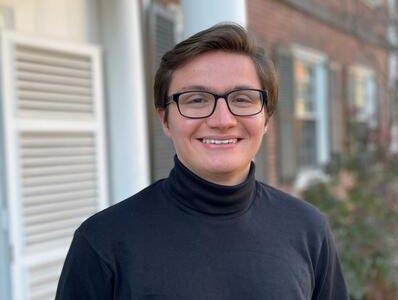
This past summer, Sebastian Ibarraran’s classroom learning came full circle with an opportunity to apply it to a chemistry problem. The Yale Chemistry student won a 2022 Summer Undergraduate Research Fellowship from the American Chemical Society Division of Organic Chemistry.
The fellowship, which provides funding for summer research opportunities for outstanding undergraduate organic chemistry students between their junior and senior years, enabled him to gain valuable experience studying the organic synthesis of naturally occurring molecules of medicinal relevance.
For his project, Sebastian, an undergraduate student in the research group of Timothy Newhouse, associate professor of chemistry, helped build a machine-learning model to predict enantioselectivity for the Negishi cross-coupling of tetra-substituted biaryls.
“Predicting the enantioselectivity is really important,” said Sebastian, “because it improves the efficiency, potentially, of not just campaigns to new drugs, but also the manufacturing of medicinal compounds, and prevents unwanted products that could either make the whole process more complicated or have dangerous unintended health effects.”
Sebastian was involved in many different roles throughout the project. He used density functional theory calculations to provide the necessary input for the model in the experiment. He also tested ways to optimize the architecture of the model. And, under the guidance of his mentor Abbigayle Cuomo, a graduate student from both the Newhouse Group and Batista Lab, he learned Python programming language to implement algorithms and understand the driving features behind the reaction.
“As the summer went along, we split a lot of the machine-learning work and calculated it,” Sebastian, who is also pursuing a certificate in data science at Yale, said. “It was definitely valuable to me because I felt super integrated into the frontline parts of this project.”
“Sebastian made key contributions to designing and computing features which he then used for model development,” said Professor Newhouse. “His instrumental contributions resulted in being a co-author on a forthcoming manuscript.”
The interdisciplinary project, which is still ongoing, is a collaboration between the Newhouse Group, the labs of Victor Batista, John Gamble Kirkwood Professor of Chemistry, Robert Crabtree, C.P. Whitehead Professor of Chemistry Emeritus, and Boehringer Ingelheim Pharmaceuticals. Inc. The team hopes to discover more efficient machine-learning approaches to facilitate the synthesis of therapeutics.
“I left this project feeling very sure that I want to go on to a Ph.D. next year,” said Sebastian, “and specifically do computational research that has a very close relationship informing and enhancing experimental work.”
In addition to presenting his research findings during a virtual conference and again in a poster session at Pfizer Research and Development Labs in Groton, Connecticut, as part of the SURF program, Sebastian co-authored two papers as a result of this project. He is 2nd author of “Feed forward neural network for predicting enantioselectivity of the asymmetric Negishi reaction,” published in ChemRxiv, and a contributing author of “Unified total synthesis of the limonoid alkaloids: Strategies for the de novo synthesis of highly substituted pyridine scaffolds” published in Chem. He is currently applying to chemistry Ph.D. programs as he completes his senior year at Yale.
Organic chemistry connects fundamental science to translational impact in numerous industries, from pharmaceutical to biotechnology, to fine chemical production and manufacturing, and all the way to new fields advancing materials design, energy sciences, and synthesis of a limitless set of useful substances. Learn more about organic chemistry at Yale.